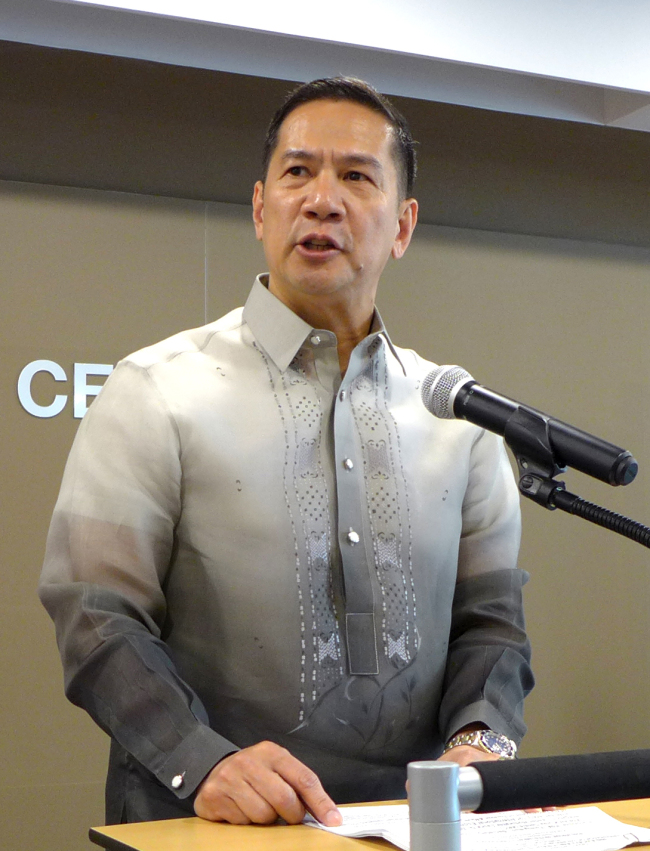Investing in the Philippines will lay a bridgehead into the ASEAN market of 600 million people and a gross domestic product of $3 trillion, diplomats highlighted in an investment seminar organized by the Philippine Embassy in Seoul and the ASEAN-Korea Center.
A delegation of 20 officials from the Philippines, led by foreign undersecretary for international economic relations Laura del Rosario, participated in the event on May 28 in Seoul.
The team, comprised of public enterprises from the Central Luzon region, met members of the Korea Importers’ Association and Korean companies in construction, engineering and utilities.
Rosario, who chaired the Asia-Pacific Economic Cooperation senior officials’ meeting prior to coming to Korea, said she observed inquiry and interest from Korean conglomerates and medium-sized companies.
A delegation of 20 officials from the Philippines, led by foreign undersecretary for international economic relations Laura del Rosario, participated in the event on May 28 in Seoul.
The team, comprised of public enterprises from the Central Luzon region, met members of the Korea Importers’ Association and Korean companies in construction, engineering and utilities.
Rosario, who chaired the Asia-Pacific Economic Cooperation senior officials’ meeting prior to coming to Korea, said she observed inquiry and interest from Korean conglomerates and medium-sized companies.

“The relations between the Philippines and Korea have always been close, as we were brothers in arms against communism since the early 1950s. I grew up around Koreans at American military bases in the Philippines,” Rosario said in a speech.
“The Jangchung Gymnasium in central Seoul, which was recently renovated, was built by Filipino workers until 1963. In a happy turnaround of events, many Korean construction companies are undertaking infrastructure projects in the Philippines.”
The Philippine department of public works will allow Korean companies to register on equal terms as local companies, she noted, while pointing out to the soon-to-be-integrated ASEAN market by the end of this year.
The deputy undersecretary also praised Korea’s cultural diplomacy in the Philippines, which has been so successful that her parliamentarian colleague is learning Korean language and history through soap operas.
“The Filipinos are called the people of the diaspora, as we are scattered all over the world. Our families abroad have brought home elements of their local cultures, enriching our own,” she explained. “Multiracial marriages, including between Filipinos and Koreans, have strengthened our ties.”
Korean company executives benefit from the country’s new legislation in July last year, which allows full entry of foreign banks into the country, Rosario underscored.
Philippine Ambassador Raul S. Hernandez said that Korea is well placed to take advantage of the strategic location and burgeoning market of the Philippines, with 120 flights between the two countries every week. As more than 90 percent of Filipinos are Christian and English is an official language, Koreans easily adjust to life on the island, he said.
The Philippine economy grew by 7.2 percent in the first quarter of this year, one of the fastest rates in Southeast Asia. It has registered positive growth for 65 consecutive quarters since 1999.
The ambassador highlighted investment opportunities in Central Luzon, which is a “growth corridor” north of the capital Manila.
“Manila is fast becoming a competitive mega-city due to its size, young population and productivity,” the ambassador said. “Our government has taken steps to root out corruption and establish good governance. Doing business in the Philippines has become easier, faster, more profitable and sustainable, with improved infrastructures.”
Foreign investors can enter priority areas of manufacturing, airport and industrial park development, aviation, tourism, leisure, information communication technology, agricultural and agro-industrial sectors, he added.
Kim Young-sun, the newly appointed secretary-general of the ASEAN-Korea Center and former Korean Ambassador to Indonesia, said Korean companies can reap benefits of the Southeast Asian market through local production.
“The Philippines have emerged as an attractive destination with investment incentives and skilled labor,” he said, while highlighting the leadership of Philippine President Benigno Aquino III that has helped national stability and market dynamism.
By Joel Lee (joel@heraldcorp.com)
-
Articles by Korea Herald









![[Weekender] Korean psyche untangled: Musok](http://res.heraldm.com/phpwas/restmb_idxmake.php?idx=644&simg=/content/image/2024/05/02/20240502050841_0.jpg&u=)








![[Eye Interview] 'If you live to 100, you might as well be happy,' says 88-year-old bestselling essayist](http://res.heraldm.com/phpwas/restmb_idxmake.php?idx=652&simg=/content/image/2024/05/03/20240503050674_0.jpg&u=)
